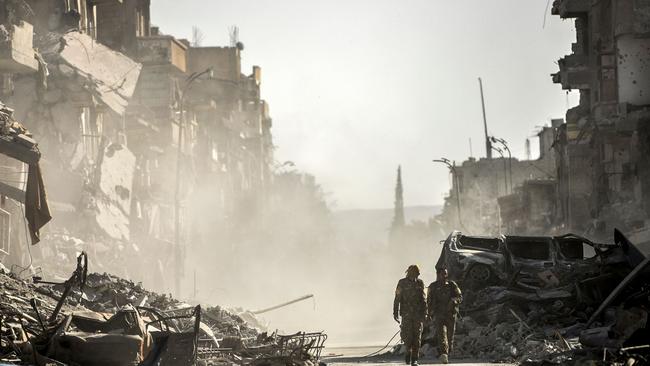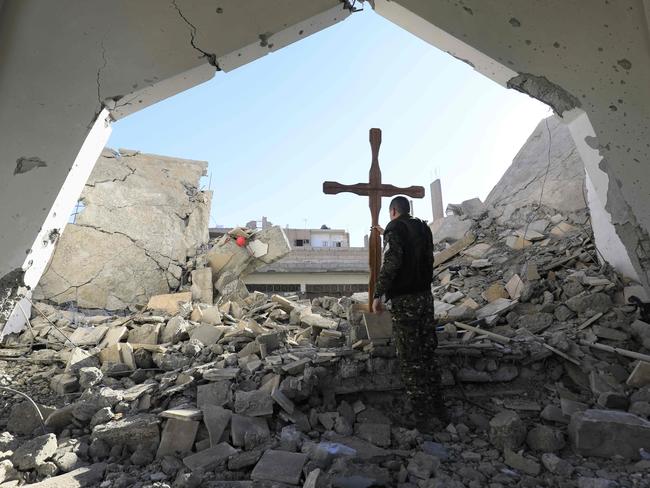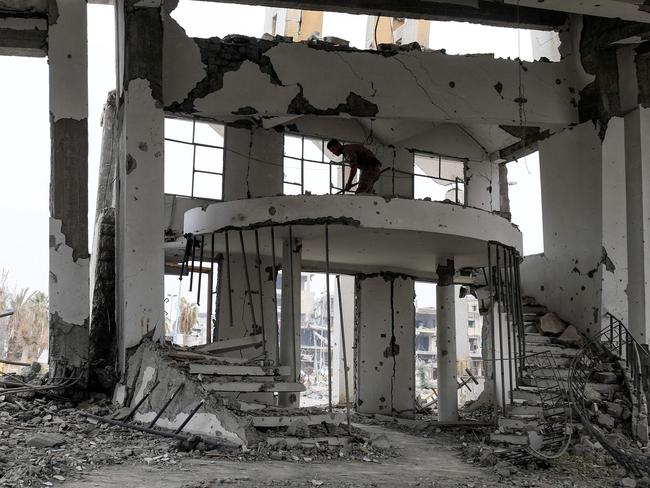IS like a ‘cornered cat trying to save itself’
TERROR analyst gives chilling warning over Islamic State and says the war is far from over against the “virtual caliphate”.

THE war against Islamic State is far from over and many more people will die before the terror group is defeated for good.
That’s the dire warning given by experts who predict the embattled jihadi group will retreat into a “virtual caliphate” where it will inspire lone wolf attacks in the West.
US counter-terrorism expert and former Department of Homeland Security official Peter Vincent told NBC News that IS would remain a deadly threat into 2018, despite having lost significant ground in Iraq and Syria.
“It’s like a cornered cat that will lash out indiscriminately and viciously to save itself,” Mr Vincent told the broadcaster.
“The war has yet to be won, and if it’s ever going to be won it’s going to take many more years and many more civilians will lose their lives.”
IS lost its de facto capital Raqqa in Syria as well as Mosul in Iraq and this month the Pentagon said 97 per cent of territory gained by the terror group had now been liberated.

On December 9, Iraqi Prime Minister Haider al-Abadi announced the liberation of all of the country’s territory that was under IS control, completing a US-backed campaign of about three years against the radical Sunni group.
However Iraqi military expert Sarmad al-Bayati said the presence of the jihadists “still represents a real threat to the region”.
Mr Bayati said IS extremists hide during the day but “have total control of certain areas at night”.
He also said jihadists were still carrying out “attacks and kidnappings and because of that many displaced people are refusing to return home”.
The jihadists’ defeat is a massive turnaround for an organisation that once ruled over millions of people in a territory as big as Italy encompassing large parts of Syria and nearly a third of Iraq.
However some analysts have predicted the declaration is a little premature given recent attacks by militants including one near the city of Tikrit, 170km north of Baghdad, last Sunday which killed four pro-government militiamen.

‘LIKE A GOPHER’
The warnings over the defeat of IS are not new.
Speaking to news.com.au in June last year following the liberation of Fallujah, Australian anti-terrorism expert Warren Reed warned the war against IS would take deadly new forms.
Mr Reed said the defeat would be a hard-fought battle and IS could still be capable of making a deadly impact long after it lost territory.
“ISIS will pop up like a gopher from the ground and morphing into other areas, particularly overseas with homegrown attacks,” he said.
Mr Reed, a senior security analyst who was trained by British spy agency MI6 and served 10 years with the Australian Secret Intelligence Service, said IS would not go down without a fight and warned it would try to encourage lone wolves to carry out attacks on home soil.
Shiraz Maher, deputy director of the International Centre for the Study of Radicalisation and Political Violence at King’s College London told NBC the notion the group can be defeated wasn’t accurate.
“This is an ongoing threat — it’s a live event,” he said.
Warnings over the group’s defeat come as Australia announced an end to its air strike operations against the terror group in Iraq and Syria.
The country’s six Super Hornet fighter jets will soon head home in a major reduction to Australia’s commitment to battling the militants in the region, three years after it began.
Defence Minister Marise Payne last week said the move followed discussions with the Iraqi government.
Ms Payne said Australia will continue to provide support in the region through surveillance and refuelling aircraft and the 80-strong Special Operations Task Group, which supports Iraqi security forces and counter-terrorism services.



